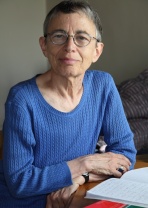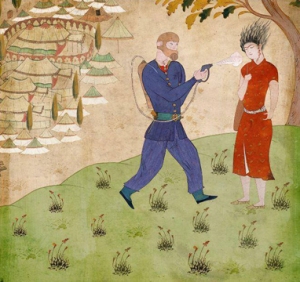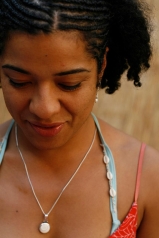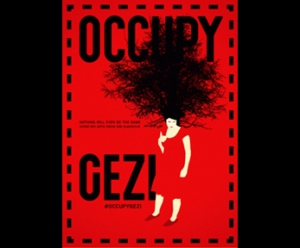by Antoine Cassar
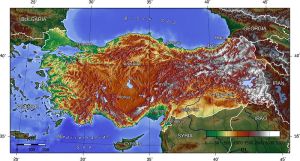
Anatolia
Map of Turkey
Tongue of rugged silk, over
or under which harmonic vowels glide.
Arm and fist, clenched too tightly
for the Ottoman ring, now resting opposite,
hanging off the Balkan diamond.
Magic carpet, swirling amid the fig trees,
floating between the fairy chimneys,
rising above the tear gas
from city to city.
Continental drawbridge
over which Geōrgios and Nâzım
trade places and return.
Out of the fertile crescent, the Anatolian
mare trudges over Upper
Kurdistan, the Armenian
Highland, leaps over
the womb of the Euphrates, the source
of the Tigris, gallops
along the cattle-starred mountain chain, juts
her head out into the sea at sunset,
invites the waves
to caress the curve of her chin
and fizzle with the foam at her mouth.
Beware! From across the Dardanelles,
the butt, stock and barrel of a rifle
may soon plug one of her nostrils
spraying pepper into her pharnyx.
Beware! Burrowing through the acidic sands
and Volgoneft oil, the mole climbing
out of the Sea of Marmara
may soon poke her in the eye.
A bell rings in her throat,
at the Gulf of İskenderun
her neck itches under the halter.
Beware! A cough, however slight,
may shudder the land enough
to knock over the nargiles
in the old madrasa courtyards,
to cause the yoga students
and standing readers
to lose their balance,
to topple the makeshift libraries
at Gezi Park.
On the Bosphorus shore, amid the mist,
the Anatolian mare waits with hüzün.
Watches the foam-white gulls
follow the wake of the pontoon.
Watches the minarets pierce the clouds,
pining toward the sun in descent.
Watches the whirling dervishes
open up to the sky like orchids,
ready to be picked
by the scythe of the moon.
Beware! On the Bosphorus shore,
amid the mist, the Anatolian mare,
like a Trojan unicorn,
waits to sneak into the 21st-
century Ottoman palace
to cough her heart out,
shattering the boutique windows,
shattering the neon adverts,
shattering the global logos,
returning the park
and all its memories
to the people of İstanbul.
Mappa tat-Turkija
Ilsien tal-ħarir imħatteb, li fuqu
jew taħtu jiżolqu
b’armonija l-vokali.
Driegħ u ponn, issikkat wisq
għaċ-ċurkett Ottoman, mitluq biswitu,
imdendel mid-djamant Balkaniku.
Tapit imsaħħar, idur mas-siġar tat-tin,
iħuf bejn iċ-ċmieni fatati,
itir ‘il fuq mill-gass tad-dmugħ
minn belt għal belt.
Pont kontinentali mniżżel
li minnu Geōrgios u Nâzım
iparttu posthom u jirritornaw.
Minn ġol-minġel għammiel, id-debba
Anatoljana tgħaddi tħakwek
mill-Kurdistan ta’ Fuq, mill-Għoljiet
Armenji, taqbeż
ġuf l-Ewfrati, għajn
it-Tigris, tiġri
tul il-katina tal-muntanji
mkewkba bil-baqar, tixref rasha
għal fuq il-baħar ma’ nżul ix-xemx,
tistieden lill-mewġ
iħarħar mal-ħnejja ta’ geddumha
u jitfexfex mar-ragħwa ta’ ma’ fommha.
Ar’hemm! Mix-xaqliba l-oħra tad-Dardanelli,
iċ-ċipp, il-maqbad, u l-kanna ta’ xkubetta
għandhom mnejn isoddulha l-minfes
u jroxxulha l-bżar sal-qiegħ ta’ ħalqha.
Ar’hemm! Għaddejja tħaffer fl-irmiel aċidużi
u ż-żejt tal-Volgoneft, it-talpa tielgħa
minn ġol-Baħar ta’ Marmara
għandha mnejn tniggiżha f’għajnha.
Qanpiena ddoqq fi griżmejha,
fil-Kalanka ta’ İskenderun
taħt il-kappestru għonqha jħokk.
Ar’hemm! Sogħla, imqar ħafifa,
għandha mnejn theżżeż l-art biżżejjed
biex twaqqa’ n-nargiles
fil-btieħi tal-madrasas antiki,
biex ittellef il-bilanċ
tal-istudenti tal-yoga
u l-qarrejja weqfin,
biex iġġarraf il-libreriji spontanji
fil-Park ta’ Gezi.
Ma’ xatt il-Bosfru, ġoċ-ċpar,
id-debba Anatoljana
tinstenna bil-hüzün.
Tgħasses il-gawwi abjad ragħwa
jsegwi r-rima taċ-ċattra.
Tgħasses il-minaretti jinfdu s-sħab,
jixxennqu għax-xemx fi nżulha.
Tgħasses id-driewex iduru durella
jiftħu lejn is-sema donnhom orkidej,
lesti ħa jinqatgħu
minn minġel il-qamar.
Ar’hemm! Ma’ xatt il-Bosfru,
ġoċ-ċpar, id-debba Anatoljana,
bħal unikornu ta’ Trojja,
tistenna ħa tinfilza fil-palazz
Ottoman tas-seklu 21
biex tisgħol kemm tiflaħ qalbha,
tkisser il-vetrini tal-boutiques,
tkisser ir-riklami tan-neon,
tkisser il-logos globali,
trodd lura l-park
bit-tifkiriet kollha tiegħu
lin-nies ta’ İstanbul.
Antoine Cassar’s writes on his blog: “in admiration of the çapullers protesting the planned construction of an Ottoman-style shopping centre at Gezi Park, countering the tear gas and pepper spray with street theatre, yoga classes, and makeshift libraries, I translated Nâzım Hikmet’s Invitation into Maltese. The first stanza of Hikmet’s poem compares the Anatolian peninsula to the head of a mare galloping out of Asia. The poetic Map of Turkey above is inspired by this cartographic image, and by the creative resistance of the çapullers of Gezi. (Read more about the Atlas project here.) I wrote it simultaneously in Maltese and English, allowing the two languages to guide each other freely. They should be considered as equal originals. It’s an interesting dynamic; in the Maltese, the images seem to come across more vividly, and more physically, also with the help of alliteration, whereas the English helps me to simplify the rhythm and poetic logic.”

Antoine Cassar
Antoine Cassar is a Maltese poet, translator, editor, and cultural organiser, and a creative activist for migrants’ rights and universal freedom of movement. Born in London to Maltese parents in 1978, Cassar grew up between England, Malta and Spain, and worked and studied in Italy, France and Luxembourg. One of Cassar’s most important poetic works to date, Passaport (2009), printed in the form of an anti-passport for all peoples and all landscapes, has been published and presented in eight languages, in a number of cities in Europe, Asia and North America, with profits donated to local associations providing assistance to refugees and asylum seekers in nine countries. Since March 2013, Antoine Cassar is the editor of Le monde n’est pas rond.






